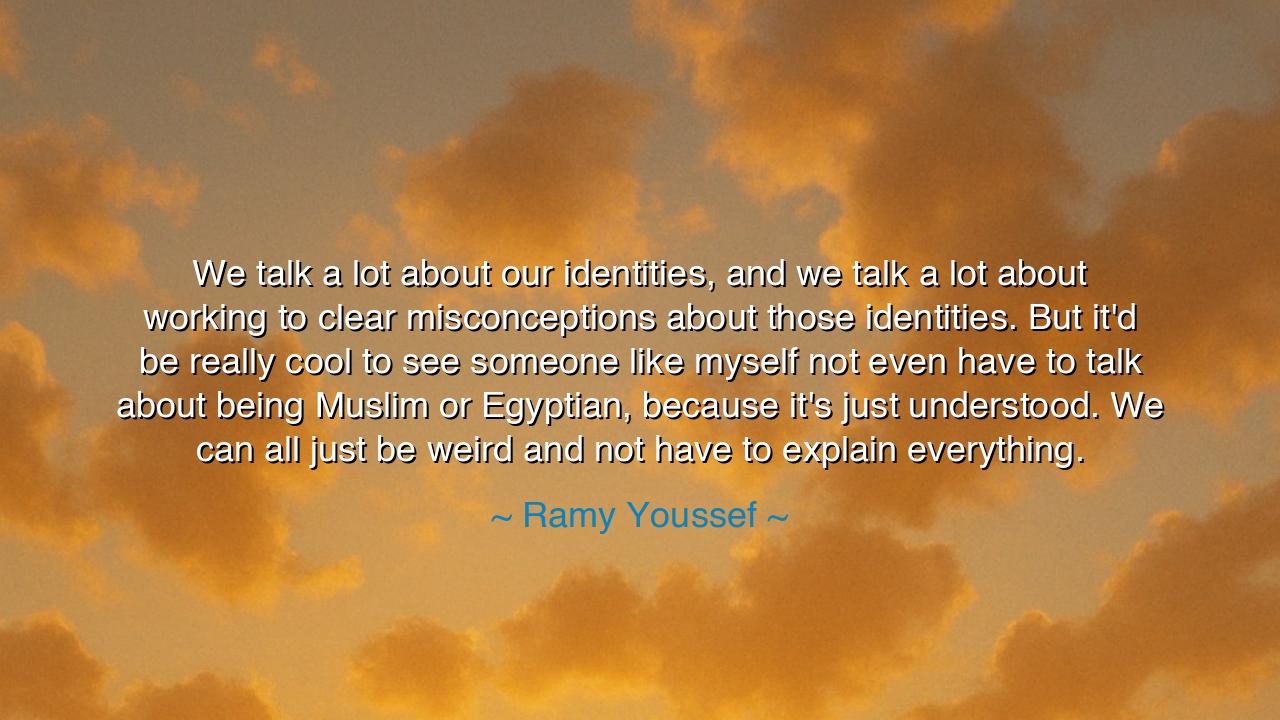
We talk a lot about our identities, and we talk a lot about
We talk a lot about our identities, and we talk a lot about working to clear misconceptions about those identities. But it'd be really cool to see someone like myself not even have to talk about being Muslim or Egyptian, because it's just understood. We can all just be weird and not have to explain everything.






“We talk a lot about our identities, and we talk a lot about working to clear misconceptions about those identities. But it’d be really cool to see someone like myself not even have to talk about being Muslim or Egyptian, because it’s just understood. We can all just be weird and not have to explain everything.” – Ramy Youssef
Hear these words, O children of the new age, and feel their weight as one feels the ancient pull of truth. In this saying, Ramy Youssef, the storyteller of our times, speaks not only for himself but for all souls who have borne the burden of identity. He dreams of a world beyond explanation, a world where one’s essence need not be defended or justified, where one’s faith, lineage, and skin are not questions to be answered, but simple truths to be honored and understood. His longing is not for silence, but for peace—the peace that comes when understanding no longer needs translation.
For countless generations, people have had to explain who they are to those who could not see them clearly. They have had to peel away the layers of others’ misconceptions, fighting not only for respect but for recognition of their humanity. Yet Youssef, in his quiet wisdom, dreams of something gentler, higher. He speaks of a time when being Muslim, being Egyptian, or simply being different will no longer require preface or apology. When a man can create art, tell stories, and live in laughter without his faith being an exhibit or his culture being a question.
Such a world once seemed distant, but humanity has seen glimpses of it before. Remember the story of Zaha Hadid, the Iraqi-born architect who reshaped the skylines of the world. When she began, she was told that a woman from the Middle East could not design the cities of the West. Yet she built without apology, her structures bending like rivers of glass and steel, her vision transcending boundary and bias. In time, they ceased to speak of her as a “female Arab architect” and simply called her what she was—a genius. Her work spoke the universal language of beauty, needing no explanation.
Youssef’s yearning mirrors hers. It is the desire of every person who has carried the weight of difference and longed to lay it down—not to erase who they are, but to be free from the burden of explaining it. To be “weird,” as he says, is to be fully human—to laugh, stumble, imagine, and exist without being reduced to a label. His words whisper of liberation, not from culture, but from the cage of perception.
The ancients taught that true harmony arises when diversity no longer divides but delights. Just as a garden is not beautiful for its uniformity but for its many colors, so too is humanity made richer by its differences. Yet harmony cannot bloom if every flower must prove it belongs. When one must constantly explain their identity, they are denied the right to simply be. And thus, Youssef’s vision is both a hope and a challenge—to build a world where the sacred truth of who we are is already understood, and where curiosity does not wound, but honors.
To those who listen, take heed: if we wish to reach this future, we must first look within. Let each of us examine the assumptions we carry about others—the quiet judgments, the invisible walls. When you meet another soul, see not the symbols that mark their tribe or creed, but the humanity that mirrors your own. Ask not for them to explain their existence; instead, learn to understand through compassion, patience, and shared experience.
The lesson is clear and radiant as dawn: true equality is not achieved when everyone is the same—it is achieved when everyone is seen as whole. Let us strive for a world where the Egyptian, the Muslim, the woman, the wanderer, and the artist need not explain themselves to belong. Let us create spaces where all may be weird, free, and joyous in their individuality.
And so, remember this teaching of Ramy Youssef—not as a complaint, but as a prophecy. The day will come when identity no longer needs explanation, when the heart of humanity beats in one rhythm across many forms. Until then, be kind, be open, and when you see someone carrying the weight of being misunderstood, lift it with your empathy. For in doing so, you help bring forth the world he envisions—a world where every person may finally say, I am known, without needing to explain.






AAdministratorAdministrator
Welcome, honored guests. Please leave a comment, we will respond soon